- Home
- Naguib Mahfouz
Akhenaten: Dweller in Truth Page 7
Akhenaten: Dweller in Truth Read online
Page 7
When the king learned that the priests were claiming the throne for Tutankhamun, thus pressuring him to abdicate, he declared his brother Smenkhkare co-regent. But his entire world fell apart when Nefertiti left the palace. That was the end of evil; only by that time the serpent had injected its venom. Akhenaten's union with Nefertiti was a grave misfortune for Egypt. Nefertiti was undeniably a strong, capable, and wise queen. And a very beautiful one indeed. But, like her husband, ambition plagued her. She claimed that she shared Akhenaten's faith in the One God. In reality she only shared with him his wickedness and deception. She never loved him. She could not have loved him even if she wanted to. Her single true passion was for absolute power. Perhaps Nefertiti was a final proof of the role Ay played in the tragedy; she was the product of her father's flaws. I remember how Ay and his wife sat grandly on the terrace of the palace during public ceremonies, receiving gifts of pure gold. At the end of the ceremony, slaves carried large baskets filled with these gifts to the sage's palace. It is hard to imagine, nevertheless, how a seemingly reasonable woman like Nefertiti would be so blind to the grave repercussions of her husband's policies. Did she really believe in the god of love and joy? I find that hard to swallow. I believe Nefertiti made an error in overestimating the influence of the throne on the people of Egypt. She was under the illusion that she could use the throne like a magician's wand to justify the most appalling deeds. Perhaps she realized her mistake early on but was reluctant to voice her concerns for fear of losing her husband's trust. When the men decided to leave Akhetaten, Nefertiti abandoned the king, desperately hoping that her lovers would not betray her. I believe Haremhab tried to convince the high priest of Amun to allow her to return to Thebes, but his efforts were to no avail. Eventually the heretic died. Nefertiti still lives in her prison, bitter and regretful.
Had Egypt's fiercest enemy seized the throne after Amenhotep III, he could not have done as much damage as that accursed heretic.
Tey
Tey was the wife of the sage Ay. She was seventy years old, a woman of small stature but strong and charming. She had married Ay after the death of his first wife. Nefertiti was a child of one or two years at most when Tey married her father. Not too long after, Tey gave birth to Mutnedjmet. Tey was not a typical stepmother; she was extremely fond of Nefertiti. Likewise, when Nefertiti became queen, she chose Tey as one of her maids of honor and gave her the title of queen's matron.
I related to Tey the information I had obtained thus far. “I do not wish to encroach on your time. If you have nothing to add I shall leave you in peace.” But Tey began to tell her story.
I did not know the king all that well, despite the intimacy I shared with his wife. Indeed he addressed me personally only a few times. But his sweetness has never left me. My husband had been his tutor since he was a boy, so we got to hear a lot about him. Mutnedjmet and I were quite disturbed by his offensive opinions about Amun, his attraction to Aten, and finally his claim to have found a new god. Nefertiti, however, did not share our concerns.
I ought to tell you a few things about Nefertiti first. She was a very intelligent young woman, eager and passionate, inspired by beauty, and intensely drawn to the mystical questions of religion. She seemed so mature for her age that one day I said to Ay, “It seems that your daughter will become a priestess!”
Nefertiti and Mutnedjmet used to bicker sometimes, the way sisters do, but Nefertiti was always in the right. I do not recall a single time when I could place the blame on her. And she always made up with her sister, as an elder sister should do. As for her education, she was so very good that I was afraid my daughter might do something dreadful out of jealousy.
The first thing we noticed was that she would listen admiringly as her father told us about the crown prince. Then she seemed to be developing an immense liking for Aten. But when she broke the news that she now believed in Akhenaten's One and Only God, we were aghast. “But Akhenaten is a heretic,” Mutnedjmet said to Nefertiti.
“He has heard the voice of God,” Nefertiti replied confidently.
“Then you, too, are a heretic,” Mutnedjmet cried.
Nefertiti had a very beautiful voice, and we used to enjoy hearing her sing:
What should I say to Mother?
Every day I brought back game.
This time I set not the snares,
For by your love I was possessed.
After she declared her new faith, we often heard her singing alone in the garden to her new god, but then we showed no enthusiasm, not even for her heavenly voice. We did not want to encourage her. I still remember clearly hearing her as I stood in my room combing my hair one morning:
O Eternal One,
O Graceful and Mighty One,
In thee we rejoice
And the universe has filled
With light.
Our palace became one of the first places where the hymns of the new religion echoed. Then one day we were invited to celebrate the thirtieth anniversary of the coronation of Amenhotep III. We were allowed for the first time to extend the invitation to our daughters, so that they, too, could witness a celebration in the pharaonic palace. I was delighted at the idea that Nefertiti and Mutnedjmet might appeal to some of the eligible young men at the party, and I made sure they were dressed for the occasion. They wore beautiful flowing dresses, with embroidered shawls draped over their shoulders, and golden sandals with high straps.
When we arrived at the royal palace, we entered a hall the size of our entire house. Along the walls flaming torches encircled the guest seats. The throne was set up between two rows of seats for princes and princesses. The center of the room was left for the musicians and naked dancers. Slaves moved among the guests carrying censers and trays loaded with the most exquisite food and drink. I looked over the best of the young men in the hall. For my two daughters I fancied the aspiring officer Haremhab and the talented sculptor Bek. Then I saw how the eyes of the notables, Haremhab, Bek, Nakht, Mae, and many others, followed Nefertiti, particularly when the chance came for the young noblewomen to dance and sing before the king. My beloved Nefertiti danced so elegantly and sang with such a sweet, captivating voice that she outdid the professional singers. Perhaps for that one night I shared Mutnedjmet's silent jealousy. I found solace in thinking that if Nefertiti was married, Mutnedjmet's light could shine unrivaled. I watched Nefertiti curiously, to see if her attention was drawn to anyone in particular. I was surprised to see that she was looking toward her spiritual master, the crown prince. I glanced in his direction and was appalled by his strange appearance.
“I pictured him a giant,” Nefertiti whispered to me when our eyes met.
Yet her fascination was greater than her surprise, though I am certain she did not even dream what destiny had in store for her. When we returned to our palace I said to my husband, “The suitors will come knocking on our door, so be prepared.”
“The gods chart our destiny,” he replied in his usual calm voice.
When a day or two had passed, Ay delivered some surprising news to us. “The queen wishes to meet Nefertiti,” he said.
We were taken aback. “What does this mean, Ay?” I asked.
He pondered for a while, then said, “She may want to offer her a position in the palace.”
“But you must know more.”
“How can I know what is in the Great Queen's mind, Tey?”
Ay taught Nefertiti the protocol for meeting Her Majesty. I asked Amun to bless and protect her.
“I ask the protection of the One and Only God,” Nefertiti protested.
“Do not utter such foolishness in the presence of the queen,” Ay scolded her.
When she returned after meeting the queen she was so overwhelmed by emotion that she threw her arms around me and burst into tears.
“The queen has chosen her to be the wife of the crown prince,” Ay announced.
We were overjoyed. Nefertiti had risen above any jealousy we might have harbored in our hearts. She had
opened the door for us to become part of the pharaoh's family, and her good fortune elevated us above the rest. I congratulated her from the depths of my heart, and so did Mutnedjmet. Nefertiti told us everything that had happened between her and the Great Queen, but I was so excited that I did not really listen properly. In fact, I do not recall any of what she said. But what is the importance of words compared to the event itself?
The marriage ceremony was so lavish that it reminded all the elders of the wedding of Amenhotep III. We became related to royalty, and my dear Nefertiti appointed me queen's matron, a position that ranked next to princess. In marriage Nefertiti and the prince became one soul that could be separated only by death. She shared his joy and his sorrow until just hours before the end. She managed with him the affairs of the country with the skill of a woman born to the throne. She shared with him the weight of his religious message as though she had been chosen by the One God to be his priestess. Believe me, she was a great queen in every way, so I was shocked at the news of her sudden desertion of her husband in extreme adversity. That was perhaps the only decision she made without consulting me. I hurried to her palace and sat at her feet, overcome by tears. She did not seem to be affected by my grief.
“Go in peace,” she said calmly.
“Those who have abandoned the king are only complying to protect him from danger, but you…,” I pleaded.
“Go in peace,” she interrupted me coldly.
“And you, Your Highness?” I asked in disbelief.
“I will not leave this palace,” she replied.
I was about to say more but she stopped me with a firm voice. “Go in peace.”
When I left her palace I was the most miserable woman in the universe. For a long time I tried to think what could have driven her to disappear and isolate herself in that way. Only one reason seemed feasible: Nefertiti had so dreaded seeing the king fall that she preferred, in a moment of desperation, to flee. Yet I am certain that she left with the intention of returning to him after all the others had gone, just as I am certain that she must have tried to return but was prevented by force. Do not believe anyone who says otherwise. You will hear conflicting accounts and every man will claim to have spoken the truth, but they all have their biases. Life has taught me not to trust or believe anyone. Here we are now, so much time has passed, and I still wonder: Did Akhenaten deserve such a sad end? He was a noble, truthful, compassionate man. Why did they not return his love, why did they attack him like animals, tearing him and his kingdom apart as if he was their enemy? I saw him in my dreams a few years ago. He was lying on the ground, blood seeping out of a deep wound in his neck. I'm sure they killed him and made out he had died a natural death.
Mutnedjmet
Mutnedjmet was in her early forties, beautiful, slim, her honey-colored eyes gleaming with intelligence. I felt in her presence a distance that could not be readily crossed. Mutnedjmet is the daughter of Ay and Tey, and sister of Nefertiti. She lives in a private suite in Ay's palace. She never married, though she had several suitors. Why this should be remains a great mystery. The moment I sat before her and spread my papers she began to talk.
It was destined that we take part in the tragedy of the heretic. My father Ay was chosen to be his teacher, and through him we heard about the prince's peculiar ideas. From the very beginning I did not think well of him. I doubted his sanity, and in time I was proven right. Nefertiti, on the other hand, took a different stand. I had always known that she had an insatiable craving for attention. She would often whip up storms from trivial arguments just to entertain herself. Yet I was still surprised when she declared her opinion on the ravings of the crown prince. There is no question that she had a brilliant, astute mind. But her most virulent flaw was that she was incapable of being sincere. Thus she renounced the worship of Amun and replaced him with Aten. Indeed, she renounced all the gods and declared her faith in a god that we had never heard of before.
“Father,” I overheard her say one afternoon, “tell the crown prince that I believe in his God.”
“Don't be foolish,” Father cried. “You do not realize the gravity of what you are saying.”
I was afraid that her heresy would bring a curse upon us. My faith in my gods was never shaken. Yes, I declared my faith in the new god, but only out of necessity. After all, I was related to the pharaoh's family. Besides, I thought that I could probably defend my gods more effectively from within than if I had been cast out. But you must understand that my faith never faltered. Never.
I saw the heretic for the first time on the thirtieth anniversary of King Amenhotep III's rule. His physical appearance was as distorted as his ideas. Hideous and sickly, that was how I found him from the beginning. Don't believe what you heard about Akhenaten and Nefertiti's noble love. Nefertiti and I were raised together. I knew her too well to believe that that repulsive, effeminate creature had anything in common with the man of her dreams, whom she had longed for since we were young girls in our father's palace.
During the Sed festival, Nefertiti's true nature came out—a trained whore, exposing her beauty without shame. I remember she tried to get the attention of Haremhab, but he rejected her banality. When I was invited to perform before the king and queen, I danced with the dignity of a decent young woman from a noble family. Then I chose a song praising our great pharaoh:
In a festival of glory
You have come,
Like a bright horizon after a storm,
A refuge, an end to hunger.
You are a bringer of warmth.
As for Nefertiti, she appalled the audience with an obscene dance; of course she won the admiration of some vile spectators. To make matters worse, she sang like a born and bred whore:
Let us drink to your beauty
Until we are exhilarated.
Tonight I came to set the trap.
May we both be captured,
You and I, with no other.
Hold my hand, come,
We shall soon be there.
My father's head dropped in shame, and my mother stuttered before the censuring eyes that demanded an explanation. Even the professional entertainers whispered to each other in disbelief. That night, when we returned to our palace, I was certain that Haremhab was the subject of Nefertiti's dreams. She hoped that in the morning he would come knocking on her door. But destiny had yet to treat us, and indeed all of Egypt, to a momentous surprise. Nefertiti was invited to meet Queen Tiye. When she returned from the palace, she was Akhenaten's betrothed.
“Shouldn't the crown prince strengthen the succession of the throne by marrying a princess with royal blood?” I asked my mother.
“If the pharaoh has accepted the prince's intended bride knowing that she is not royalty, then it can't be important,” Mother replied. “Remember, the pharaoh himself didn't marry a princess.” Then she kissed my forehead tenderly and whispered, “Be patient, Mutnedjmet. There is no question that you are superior to Nefertiti in every way. But when fate is in command, we become helpless spectators. Try to be content with your lot. After all you will be the queen's sister, nothing short of a princess. You must not forget that your fortune will come to you inasmuch as you are loyal to your sister.”
“Thank you for the advice, Mother,” I replied firmly, “but I have enough wisdom to realize my new obligations. My loyalties, however, will not change.”
Later, Nefertiti and I talked privately. “Are you really fond of him?” I asked.
“And who might you be referring to?” she teased.
“Your future husband, of course.”
“He is a miracle among men,” she replied enthusiastically.
“As a man, too?”
“There is no separation between the man in the priest and the priest in the man.”
I knew what she was thinking; I could always read her mind. She would share the king's throne as queen and priestess, and gratify her lust elsewhere. And she carried through her decision, encouraged by her husband's impoten
cy and his policy that abolished punishment. I learned about Akhenaten's perverse sexuality through my daily visits to the harem. There they knew facts that remained hidden from the closest of his men. It was the women of the harem who exposed the sinful relationship between the king and his mother, the only woman in whose embrace he was able to overcome his impotency. The Great Queen was both his mother and the mother of his daughter. Our country had never known such evil before. I knew then that I was destined to witness the darkest time in the history of Egypt. I vowed that I would always stand with the truth wherever it may be.
Amenhotep III died and Nefertiti became queen of Egypt and the empire. We lived some dreary days in Thebes, before moving to Akhetaten, the most beautiful city the world has known. It was magnificent in Akhetaten at first. Our days were full of joy and comfort. The gods gave the heretic a respite and paved the way for his success, but only so that he could indulge further in sin. Hence Amun was able to avenge himself just at the moment when Akhenaten thought that his god was victorious.
“Where are the gods?” I asked my mother in a moment of privacy. “Why don't they do something?”
“Mutnedjmet, this is a sign that the new god is the true one,” she replied, much to my surprise.
I stared at her in disbelief. I felt as though the world I knew had come to an end, and that a new one was replacing it. But fast as it had come, the sweet dream Akhenaten had created began to fade, and the clouds of gloom rumbled on the distant horizon. In time, the grip grew tighter on Akhetaten.

 Miramar
Miramar The Mummy Awakens
The Mummy Awakens The Beginning and the End
The Beginning and the End Respected Sir, Wedding Song, the Search
Respected Sir, Wedding Song, the Search The Mirage
The Mirage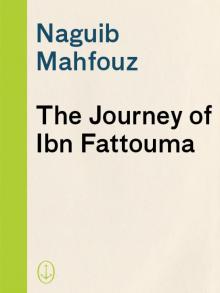 Novels by Naguib Mahfouz
Novels by Naguib Mahfouz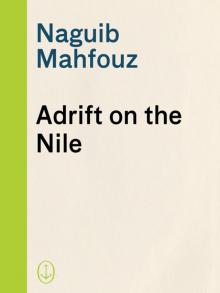 Adrift on the Nile
Adrift on the Nile Karnak Café
Karnak Café Heart of the Night
Heart of the Night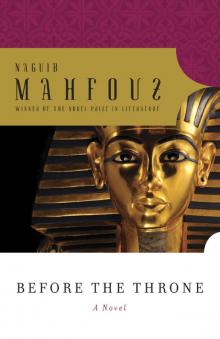 Before the Throne
Before the Throne The Time and the Place: And Other Stories
The Time and the Place: And Other Stories Cairo Modern
Cairo Modern Arabian Nights and Days
Arabian Nights and Days The Day the Leader Was Killed
The Day the Leader Was Killed Morning and Evening Talk
Morning and Evening Talk Three Novels of Ancient Egypt Khufu's Wisdom
Three Novels of Ancient Egypt Khufu's Wisdom Akhenaten: Dweller in Truth
Akhenaten: Dweller in Truth Children of the Alley
Children of the Alley Voices From the Other World
Voices From the Other World The Harafish
The Harafish The Quarter
The Quarter The Seventh Heaven: Supernatural Tales
The Seventh Heaven: Supernatural Tales The Cairo Trilogy: Palace Walk, Palace of Desire, Sugar Street
The Cairo Trilogy: Palace Walk, Palace of Desire, Sugar Street Khan Al-Khalili
Khan Al-Khalili Three Novels of Ancient Egypt Khufu's Wisdom, Rhadopis of Nubia, Thebes at War
Three Novels of Ancient Egypt Khufu's Wisdom, Rhadopis of Nubia, Thebes at War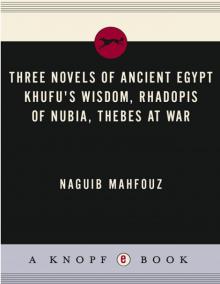 Three Novels of Ancient Egypt
Three Novels of Ancient Egypt The Time and the Place
The Time and the Place Palace Walk tct-1
Palace Walk tct-1 Akhenaten
Akhenaten The Seventh Heaven
The Seventh Heaven The Thief and the Dogs
The Thief and the Dogs The Cairo Trilogy
The Cairo Trilogy Sugar Street tct-3
Sugar Street tct-3 Palace of Desire tct-2
Palace of Desire tct-2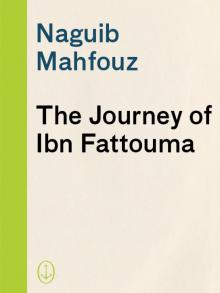 The Journey of Ibn Fattouma
The Journey of Ibn Fattouma